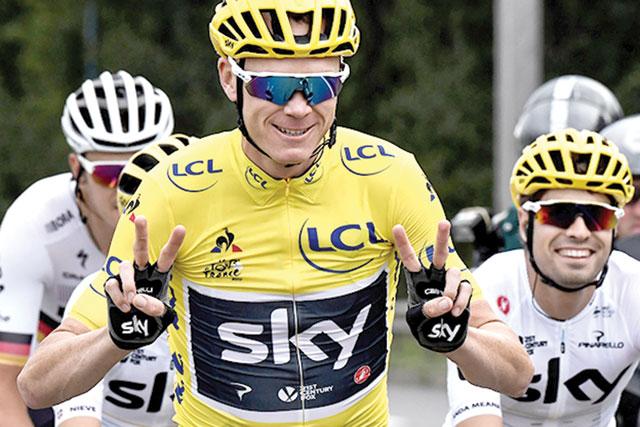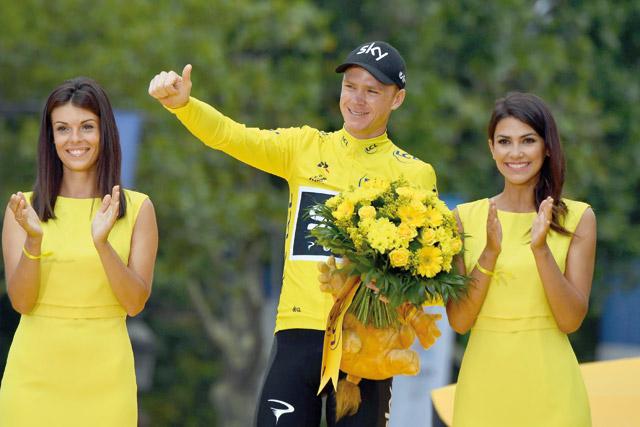You are here
Context means Nibali gets an easy ride on doping
By Reuters - Jul 24,2014 - Last updated at Jul 24,2014
CARCASSONNE, France — On the first rest day of the Tour de France, Team Sky boss Dave Brailsford wondered why Vincenzo Nibali was being let off the hook over cycling’s doping problem after last year’s champion Chris Froome was grilled multiple times on the matter.
Froome answered dozens of doping-related questions as media urged him to prove his credibility in 2013 but until Sunday, the day before the second rest day, Nibali had faced no more than three questions on the subject despite comfortably leading the general classification.
So why is Nibali having an easy ride on a theme that has dominated the sport for years?
After all, Nibali is riding for the Astana team, whose manager Alexandre Vinokourov was banned for two years for blood doping in the 2007 Tour de France.
In contrast, Team Sky have implemented a zero-tolerance policy meaning that any rider or staff member with a doping history had to leave the squad.
The reasons why Nibali has avoided being harangued are varied, but the fact he has slowly worked his way up to cycling’s pinnacle and his team being members of a key anti-doping initiative are perhaps the main ones.
Nibali snatched the overall lead on the Tour after the second stage and has therefore had to hold a news conference everyday since July 6, except after briefly surrendering the yellow jersey to France’s Tony Gallopin.
It took until last Thursday for the first question about drugs to confront Nibali, who eight years ago when cycling’s doping “Omerta” was still firmly in place said cheats should be locked up.
“Mistakes were made by a lot of riders,” the Italian said. “We need to leave these mistakes in the past and give their chance to the young riders.
“There are in- and out-of-competition controls in cycling, there is the biological passport [since 2008].”
Has he ever worked with banned doctor Michele Ferrari as a cycling team sports director and an Italian newspaper speculated in 2009?
“No, I’ve never met him personally,” said Nibali.
“They said that there were photographs where he was following me with a stopwatch in hand. We are talking about a few years ago.
“I sued, it went ahead for some time, but towards the end, they asked me to pull it because I was right, there was nothing to it. There were claims made, the photographs didn’t exist, nothing to give.”
Same coach
While Froome’s climb to the top of cycling was rather sudden, Nibali’s rise has been steady since he finished third in the time trial at the junior world championships aged 17.
Froome only burst into the limelight when he took second place overall in the 2011 Vuelta at the age of 26.
Before snatching the yellow jersey on the Tour, Nibali had finished in the top 20 of the 11 grand tours he took part in, winning the 2010 Vuelta and last year’s Giro.
It is therefore no surprise that he is competitive on the Tour this year, having also always worked with the same coach, Italian Paolo Slongo, whom he never forgets to mention in his post-race comments.
The duo have been working together since 2002.
While Astana have a tainted reputation because of the team’s previous doping history, the Kazakh outfit is a member of the MPCC — Movement for Credible Cycling.
Team Sky are not.
MPCC has enforced anti-doping rules that are stricter than that of the International Cycling Union (UCI) and the World Anti-Doping Agency (WADA), meaning, for instance, that a rider needing steroid-based drugs to heal an injury will be barred from racing for eight days.
Earlier this year, Froome competed in the Tour de Romandie after being treated for a chest infection with cortico-steroids having been granted a Therapeutic Use Exemption (TUE) by the UCI.
Had Sky been a member of the MPCC, the Briton would not have been allowed to race.
Clean athletes
Under Sky’s own anti-doping policy, two staff members, Bobby Julich and Steven de Jongh, were released from their contracts in 2012.
Sky hired doctor Geert Leinders on a freelance basis in 2010 before the team ended their collaboration in 2012 after Belgian prosecutors opened a doping investigation into him.
Yet, Sky’s 2012 Tour champion Bradley Wiggins and Froome last year faced questions on whether they were clean athletes in every news conference they held as yellow jersey holders.
Wiggins duly answered before losing his temper after a stage when asked if he believed it was possible to win the Tour without doping.
Froome always kept his composure but was clearly out of words after countless doping-related queries last year, even prompting Brailsford to ask reporters to come up with a list of questions the team would answer once and for all.
If Froome’s performances, especially in the mountains, raised eyebrows last year, Nibali’s displays has been less impressive on the Tour.
Froome’s sudden acceleration in the climb up the intimidating Mont Ventoux dropped a few jaws, as well as his ability to crush the opposition on flat time trials despite his meagre appearance. He says he is clean and cycling believes him, while with Nibali it is clear how hard he is having to work.
Finally when asking why Nibali is not constantly being grilled about doping, the very different context of this year’s race has to come into play.
Froome dominated a Tour that was under immense scrutiny as it was the season when Lance Armstrong admitted to cheating his way to seven Tour de France titles — a huge blow to a sport that has been crippled with doping.
This year, some would argue Nibali is only out in front after crashes led to Froome and double Tour winner Alberto Contador leaving the race.
Related Articles
LONDON — Four-time Tour de France winner Chris Froome could potentially be stripped of his Vuelta a Espana title after a urine test he gave
PARIS — Chris Froome put on a near-perfect performance to claim his fourth Tour de France and move within one title of cycling’s greatest on
L’ALPE D’HUEZ, France — Geraint Thomas became the first man to win up l’Alpe d’Huez with the yellow jersey on his shoulders on Thursday, as


















